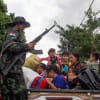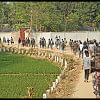Indecisiveness will cost us

We have been confused about Myanmar's crisis spilling over our border even since August 2017. On August 24 that year, the commander of our border guards, in a press conference, said we would not allow anyone to enter our border. Suddenly, on August 25, we opened our border completely, and the local administration in Cox's Bazar was very accommodating to the Rohingya. Some say this was done to win points for the national election and ahead of the UN General Assembly.
As the crisis unfolded, the question of how to handle it became another source of confusion. Initially, Bangladesh opted for a bilateral approach with Myanmar, holding talks and signing agreements. However, uncertainty arose about the effectiveness of this strategy, leading to discussions about involving the UN through agencies like IOM or UNHCR. This back and forth raised questions about the then foreign ministry's foresight and ability to manage the situation effectively from the outset.
As the crisis dragged on, we cautiously engaged China, even suggesting that a solution without its involvement might be near impossible. The September 2019 agreement with China offered hope, but the pandemic stalled progress in 2020-21. Unfortunately, both China and Bangladesh acknowledged a lack of structured communication with Myanmar. Whether direct engagement with Rakhine or Naypyidaw would be more effective remained debatable, but the reality was that our diplomatic channels were practically shut. My conversations with Chinese diplomats suggest they too haven't seen significant movement on the issue. As these crises drag on, the Joint Response Plan's budget dwindles, placing increasing pressure on Bangladesh with mounting risks.
From the onset of this current crisis, too, we saw indecisiveness from our policymakers. Until the tragic incident of mortars from Myanmar claiming the lives of a Bangladeshi and a Rohingya within our borders, did local authorities undertake any public warnings or awareness campaigns? No. Were the refugees informed of the potential risks? Again, no. Were precautions taken before armed personnel from Myanmar entered our border? Their armed entry itself presented a dilemma. We have witnessed and tolerated airspace violations and the tragic event involving a BGB member. These incidents demand clarification: are we unwittingly conveying unintended diplomatic or military signals to Myanmar through our actions?
The unsettling truth is, we simply don't understand Myanmar. They remain largely an undiscovered neighbour for us. This is deeply concerning. During attempts to establish civilian-level diplomacy through the Bangladesh Enterprise Institute, we discovered shocking misconceptions: Myanmar views us as potential terrorists aiming to occupy its land. This lack of mutual understanding extends both ways. This time too, when armed Myanmar troops entered our territory, we couldn't manage enough interpreters. So, we are not sure if these people are involved in ethnic cleansing. Consequently, we missed valuable evidence for The Gambia case at the International Court of Justice. We must bridge this knowledge gap and understand Myanmar as well as we do our other neighbours.
Md Mahfuzur Rahman Mishu is special correspondent at Jamuna Television.
Views expressed in this article are the author's own.
Follow The Daily Star Opinion on Facebook for the latest opinions, commentaries and analyses by experts and professionals. To contribute your article or letter to The Daily Star Opinion, see our guidelines for submission.

 For all latest news, follow The Daily Star's Google News channel.
For all latest news, follow The Daily Star's Google News channel. 







Comments